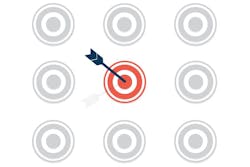A colleague in Australia sent me a fascinating video, which, coupled with an audio book I was listening to for about the third time, got me thinking. The book is Eli Goldratt’s It’s Not Luck, which discusses how a part of Theory of Constraints called ‘the thinking process’ can be applied to marketing and sales. In brief, it describes a scenario of three separate businesses, all owned by one holding company in dire trouble, having to make themselves very profitable in order to avoid being sold off, or asset stripped. The challenge is to do it without any significant investment.
Without spoiling a great, but quite complex story, the way in which one of them does it is to find what Goldratt calls a “mafia offer,” something I’ve touched on before. The idea is to create a sales proposition that is so good, a customer could never refuse it.
The video I mentioned earlier is from a business called QPlus Production in Sydney, Australia (featured in the September 2014 issue of FenderBender), which has specialized in a very specific area of collision repair. The shop is the size of a soccer field and you will never see as many Car-O-Liner frame racks under one roof—in excess of 20-—to carry out large ‘train wreck’ repairs only. They don’t do any small or medium repairs, just those that require frame straightening, with significant repair time. This shop is the brainchild of second-generation shop owner Daniel Zammit, and is co-owned by Australia’s second-largest motor insurer in order to contain costs in these types of repairs and provide a great customer experience.
What’s interesting is that market segmentation or specialization doesn’t’ require significant changes to core business, and for most shops, there are opportunities that can be seen from other examples in and out of our industry. If you thought McDonalds specialized in burgers, you’d be correct, but if you actually look at what they do, their business is extremely diverse compared to, say, In-N-Out Burger. The latter, which has a far smaller menu, illustrates just how narrow it’s possible to segment in an industry, yet still fill the place with customers.
Another successful Australian MSO of about 30 shops, Gemini Group, has selected a few shops to focus on what they call rapid repair. They have approached their insurance partners and offered to build new facilities specially equipped to repair drivable vehicles, and have achieved astonishing results, such as cycle times lower than two days.
In the U.K., another example of honing in on a particular type of repair comes from a company called AutoRestore, which is part of the large Belron Group. Some years ago, in order to satisfy the requirement of many insurers to drive down cost and cycle time, they devised a special vehicle, constructed from a van, which has a canopy that can completely cocoon a vehicle for smaller repairs. They are able to successfully repair up to four panels in all weather conditions spraying waterborne paint, as would a full-size collision shop.
AutoRestore set the benchmark for cycle time, repairing almost all vehicles within one day from 175 vans. I’m not sure how efficient their process is, because I believe they can only ever schedule one repair per day, and have to often travel many miles to the driver’s home or workplace, as well as account for some significant set-up time, but it has meant traditional collision shops have had to step up their game.
Another operation that has just begun to grow in the UK is a company called Halo. Run by a traditional family repair business called PMC, they have now created dedicated stores to carry out drivable repairs from a very small footprint, subcontracting out the larger repairs to neighboring shops. This enables them to drive down cost and cycle time while maintaining high gross margins on labor intensive (rather than parts intensive) workflow, and deskilling staff to some extent, incurring fewer stoppages with more simplified repairs.
All of the above show true market segmentation. If you think about it, the fundamental work they are doing is the same, but by separating and being very specific about the market segment they tackle, they are able to deliver extraordinary results. In addition, it makes their business internally simpler, as well as giving everyone within the organization a narrower focus.
One of the things these businesses have all demonstrated is that, working together with insurance partners, they have been able to come up with innovative solutions. By purchasing existing traditional stores, they have done ‘deals’ with insurers to meet a specific market requirement and develop purpose-built facilities at a fraction of the cost. It’s something worth considering, rather than trying to repair everything.
Jon Parker is managing director of the Byteback Group, a U.K.-based information technology and services company aimed at advancing the collision repair industry. Parker can be reached at [email protected].
